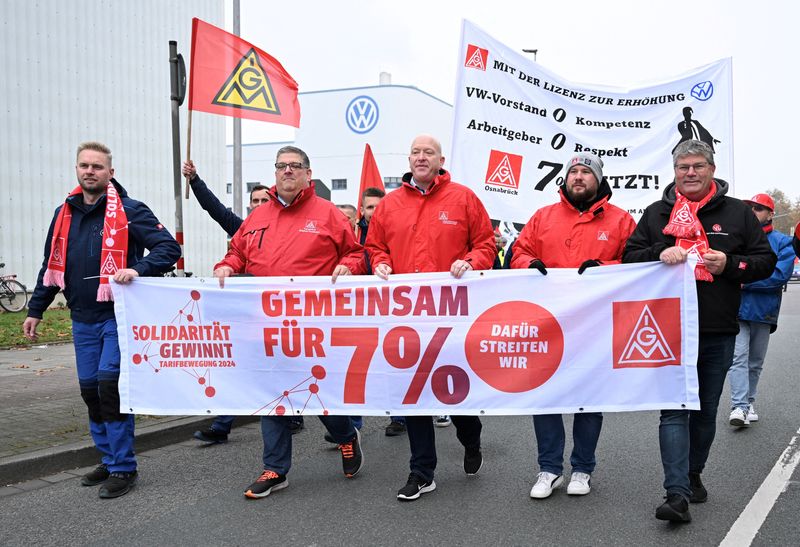Nine Volkswagen plants on strike as labour battle escalates
2024.12.02 05:00
By Victoria Waldersee and Maria Martinez
HANOVER/BERLIN (Reuters) -Workers at nine Volkswagen (ETR:) car and component plants across Germany started strikes lasting several hours on Monday, bringing assembly lines to a halt as labour and management clash over the future of the carmaker’s German operations.
Thousands gathered at the Volkswagen headquarters in Wolfsburg. Demonstrations also took place at the Hanover plant, which employs around 14,000 people, and at other component and auto plants, including Emden, Salzgitter (ETR:), and Brunswick (NYSE:).
At Volkswagen’s main plant in Wolfsburg alone, a two-hour strike means several hundred cars, including the iconic Golf, cannot be built, union sources said.
The strikes, which could escalate into 24-hour or unlimited stoppages if a deal is not struck in the next round of wage negotiations, will reduce Volkswagen’s output when the carmaker already faces declining deliveries and plunging profit.
“How long and how intensive this confrontation needs to be is Volkswagen’s responsibility at the negotiating table,” Thorsten Groeger, who leads negotiations on behalf of the IG Metall union, said.
Daniela Cavallo, head of Volkswagen’s works council, reiterated that Volkswagen’s biggest shareholders, which apart from Lower Saxony include a holding firm controlled by the Porsche and Piech families, may also have to make sacrifices with regard to the annual dividend.
She did not elaborate what that would entail.
Cavallo said the fourth round of negotiations scheduled for Dec. 9 would either result in both sides finding common ground or an escalation.
“Unfortunately, the signals recently sent by management are not really encouraging,” she said, adding plant closures, mass layoffs and cuts to existing wages were red lines for workers in the current negotiation process.
A Volkswagen spokesperson said the carmaker respected the workers’ right to strike and had taken steps to ensure a basic level of supplies to customers and minimise the strike’s impact.
The union last week proposed measures it said would save 1.5 billion euros ($1.6 billion), including forgoing bonuses for 2025 and 2026, which Europe’s biggest carmaker dismissed.
Volkswagen has demanded a 10% wage cut, saying it needs to cut costs and boost profit to defend market share as European carmakers struggle with weak demand, high production costs, competition from Chinese rivals and a slower-than-expected electric vehicle transition.
The company has also threatened to close plants in Germany for the first time in its 87-year history.
“Management wants to drive the nail in even further,” said Lucia Heim, a worker at VW’s Hanover plant taking part in Monday’s strike.
“It’s a twisted world: in football, trainers quit if they’re not winning the game. At VW, it’s the other way around. Players are being punished.”

An agreement not to stage walkouts ended on Saturday, enabling workers to strike from Sunday across VW AG’s German plants.
The labour union called on employees of the plants housed under subsidiary Volkswagen Sachsen GmbH, which include VW’s EV-only plant Zwickau, to strike on both Monday and Tuesday.








